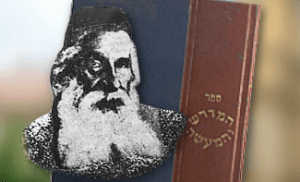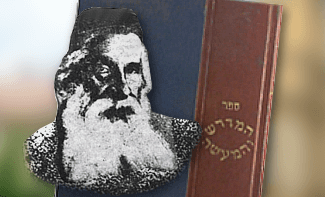
The entire assembly – all of them – are holy and Hashem is among them.
Noach’s teivah was designed to be more than a lifeboat. It was to be an educational classroom as well, instructing all life in the art of peaceful coexistence. Animals of prey changed their nature, became vegetarian, and waited patiently for their next meal.
It didn’t last, of course. Upon emerging from the ark, animals resumed their previous nature. Predators again pounced upon the weaker or slower; animals staked out their territories, which they would defend at all costs.
Humans did a little better, at least for a while. In the days of Yaktan and Peleg, people lived cooperatively, even if for less than noble purposes. The generation of the Tower demonstrated that while peace is good, not all of its varieties are equally praiseworthy.
The words of Yeshaya have inspired mankind for centuries. “The wolf will lie with the sheep.”[2] They speak of opponents putting aside their differences, and living together in pacific tranquility. This idyll has a darker side, however. It is one thing for the wolf to become docile like the lamb. We can conceive of a different arrangement between them, however. What if the lamb learns to become as vicious as the wolf, and thereby gain his respect? This kind of peace may work for the two new friends, but it is not so good for the neighborhood. Yeshaya dealt with it by appending the final words to the pasuk: “And a young child will lead them.” The wolf-sheep partnership speaks of messianic redemption only if the young child can safely play with them, but not if he becomes their shared meal.
This darker peace produced a society in which people worked together to wage war on the Divine. Hashem found it necessary to intervene, preferring dissension and belief over cooperation and kefirah.
Cooperative ventures to eliminate G-d from society never disappeared. The Korach rebellion included this as one of its elements. Essentially, there were three elements, corresponding to three types of rebellion that we have seen in history.
One type pits a group of plotters against a particular ruler. They do not dispute the need for a leader, nor aim to replace their form of government. They merely want to replace the occupant of the seat of power with a different individual, from among their group.
A second form of rebellion wishes to unseat the reigning power. The participants reject the right of the ruler and any and all of his replacements. (This has happened, for instance,when a country wishes to throw off the rule of a foreign conqueror.) They wish to replace the ruler with an oligarchy, usually a council of the participants in the rebellion.
A third kind of rebellion wishes to end the rule of authority altogether. Power, they say, belongs to the people. Who will prevent wrongdoing by criminals and opportunists, they are asked. They respond that this was a matter of concern only in earlier times. In modern, enlightened times, we need not worry about such primitive behavior. The spirit of unity and brotherhood will turn our existence into a paradise for all.
All three were represented in the Korach rebellion. Korach himself was no revolutionary, no social reformer. He simply wanted to replace Moshe with himself. The “leaders of the assembly” were not really boosters of Korach’s candidacy. They were looking for some sort of group rule – replacing Moshe, who had the position of a monarch, with a larger group – themselves. Dosson and Avirom, on the other hand had a different proposal. Proven troublemakers in the past, they represented the lowest elements of society, who wished to do away with conventional forms of governance, and somehow have the nation rule itself. “The entire assembly – all of them – are holy,” claimed Korach, and our individual inner spirits are all that we need to govern us.
The continuum of contentiousness that we witness in the Korach rebellion has implications in global politics. The distance between divisiveness and warfare, sadly, is a short one. The yetzer hora of strife and contention affects not only individuals, but nations as well.
A certain matron inquired of R. Yosi bar Chalafta: “After your G-d finished creating the world in six days, what does He now do?” He told her that he arranges matches. This woman to this man; this man; this person’s property passing to some other person. She was not impressed. “This is the work of G-d? I can do just as well myself!” She lined up a thousand of her male slaves on one line, and a thousand female slaves on another. She then paired them off. The next morning, she contemplated the debris: slaves with gashed heads, gouged eyes, broken bones. She conceded that there was none like HKBH![3]We can apply the message of this maamar Chazal to global events. At the conclusion of the World War I, world leaders gathered at Versailles to redraw the map of the world, in an attempt to arrange a stable order and institute global peace. They acted in the spirit of another prophecy of Yeshaya: “He will judge among the nations, and will settle the arguments of many peoples. They will beat their swords into plowshares and their spears into pruning hooks. Nation will not lift swords against nation, and they will no longer study warfare.”[4] Their intent was similar – but they left G-d out of their formula.A well-meaning “prophet”[5] made the same mistake as R. Yosi bar Chalafta’s interlocutor. “This is the work of G-d? I can do just as well myself! Must we wait for G-d to make peace between nations? I have so many legions of soldiers, and so many ships at sea! We will gather the war-weary at Versaille, and create peace ourselves, based on my Fourteen Points. We will establish a League of Nations that will adjudicate disputes between nations, redrawing the map, and assigning this territory to this nation, and that territory to that nation.”This did not work any better than the marriages arranged by the matron. There was no permanence to the agreements, and there was no peace.[6] Peace cannot be imposed in one day, artificially matching one nation with another. It will take the creation of a new spirit and a pure heart for the nations of the world, and only Hashem can do that.The day will come – and we will long for it and wait for it – that nations learn to love rather than hate, to build rather than destroy. It can and will happen, however, only through Hashem’s handiwork.
- Based on HaMedrash V’HaMaaseh, Korach, by R. Yechezkel Libshitz zt”l ↑
- Yeshaya 11:6 ↑
- Bereishis Rabbah 68:4 ↑
- Yeshaya 2:4 ↑
- US President Woodrow Wilson ↑
- The author died in 1932, and did not live to see just how much damage was done by the terms of Versaille. Many point to this treaty as a key cause of World War II, whose devastation to our people could not have been anticipated by him. ↑


